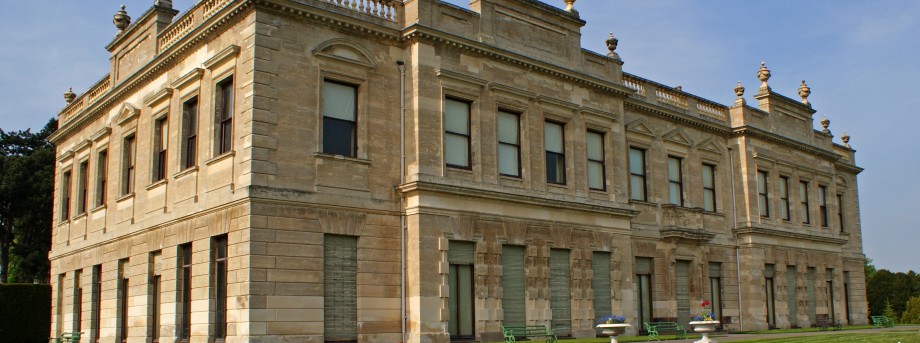The University of Nottingham
 Exchange online
Exchange online
Research Exchange
Echoes of slavery— the stately home connection

It may be over two hundred years since the abolition of the British slave trade but now untold stories about the trade’s links to stately homes in the East Midlands and Yorkshire have come to light thanks to researchers at The University of Nottingham and English Heritage.
The research by the University’s School of Geography and Department of History was commissioned by English Heritage as part of a nationwide investigation of the slavery connections of English country houses.
The work appears in a new book by English Heritage, Slavery and the British Country House edited by Madge Dresser and Andrew Hann which is published today. This new history also appears in exhibitions and guidebooks in English Heritage properties across the country.
The two country houses under the microscope in relation to possible involvement in the Atlantic slave trade and connections to slavery of the 17th, 18th and 19th centuries are Bolsover Castle in Derbyshire and Brodsworth Hall near Doncaster. Dr Sheryllynne Haggerty from the Department of History and Dr Susanne Seymour from the School of Geography have investigated the estates’ links with slavery and the slave trade and the attitudes to slave-related wealth of the owners of these famous properties.
Dominating the landscape from its hilltop, Bolsover Castle was owned by the Cavendish and Bentinck families, the dukes of Newcastle and Portland. The researchers focused particularly on the attitudes towards the slave trade and slavery of the third duke of Portland, William Henry Cavendish-Bentinck, through his political connections. He was British Prime Minister twice, in 1783 and from 1807-9 as well as Home Secretary in charge of the British colonies from 1794 to 1801. He represents the aristocratic ‘landed nobility’. This is in contrast to the owner of the old Brodsworth Hall from 1790, a French-Swiss-born businessman and financier called Peter Thellusson who represents the ‘nouveau riche’ elite merchants of international trade.
The University researchers scoured historical documents relating to the two men from a variety of sources. These included the University’s own Portland Collection in its Department of Manuscripts and Special Collections which has conserved the 3rd duke’s personal and political papers. The Portland Estate Papers held at Nottinghamshire Archives were also a useful mine of information relating to his properties.
Dr Haggerty said: “We selected the two properties to investigate different types of landowning interests, aristocratic in the case of Bolsover and mercantile in relation to Brodsworth, and varying types of connection with slavery. Susanne had already worked on the Portland family’s estates at Welbeck while I work on Atlantic mercantile culture, so this meant that we could bring our respective expertise to the project.
Dr Seymour added: “Associations of English estate owners with slavery were much more common and complex than has previously been thought. Supporters and abolitionists could even be found within the same family. Communicating these interconnections through exhibitions, displays at country houses and via electronic media promises to create a new openness and understanding of slavery and its various legacies.”
The researchers discovered that the third duke of Portland’s links with the slave trade and slavery-related issues were mainly through his involvement in the political scene of the late 18th and early 19th centuries. As Home Secretary in the 1790s, Portland clearly felt that slave-related wealth should be protected as a form of property. He held very different views to his son, Lord William Bentinck, who later became an abolitionist, and through his involvement in the defence and management of Britain’s slave-based Caribbean colonies, directly helped to perpetuate slavery through his political career.
The researchers also uncovered some evidence of a Portland stake in slave-based production and although the third duke was not a Caribbean plantation owner or trader himself, new links were uncovered to Portland cousins who were slave-estate owners in Demerara on the north coast of South America, now part of modern-day Guyana.
While Portland’s contemporary, the merchant Peter Thellusson, did not hold public office, his links to slavery were more direct. Much of his trading relied directly on production systems based on the work of enslaved Africans. He also had strong connections with slave traders and for a time acted as the London agent of the Liverpool slave trader William Davenport.
Both characters regarded enslaved Africans as a form of property which was considered a vital cornerstone of the British Empire at this time. For Thellusson, they were a commodity to be traded and invested in as a means of accumulating wealth. Such wealth enabled merchants like him to buy English land, houses and social status. For Portland, the slaves were a property right, to be defended against the increasing social and political debates on abolition and ‘the rights of man’ which threatened to open the flood gates to wider questions of property and authority of the landed nobility and government.
This new research will help English Heritage promote wider public understanding of the many ways in which the fortunes of the landed elite and their country houses were intertwined with slavery and the slave trade. Slavery and the British Country House is published by English Heritage and is available from Thursday 1 August 2013.
Tags: country houses, Department of History, geography, history, School of Geography, slavery, state home
Leave a Reply
Other News

Top prize for quantum physicist
A University of Nottingham physicist has won a prestigious medal from the Institute of Physics for […]

Zero carbon HOUSE designed and built by students comes home
Design and construct a low cost, zero carbon, family starter home, transport it to Spain, build […]